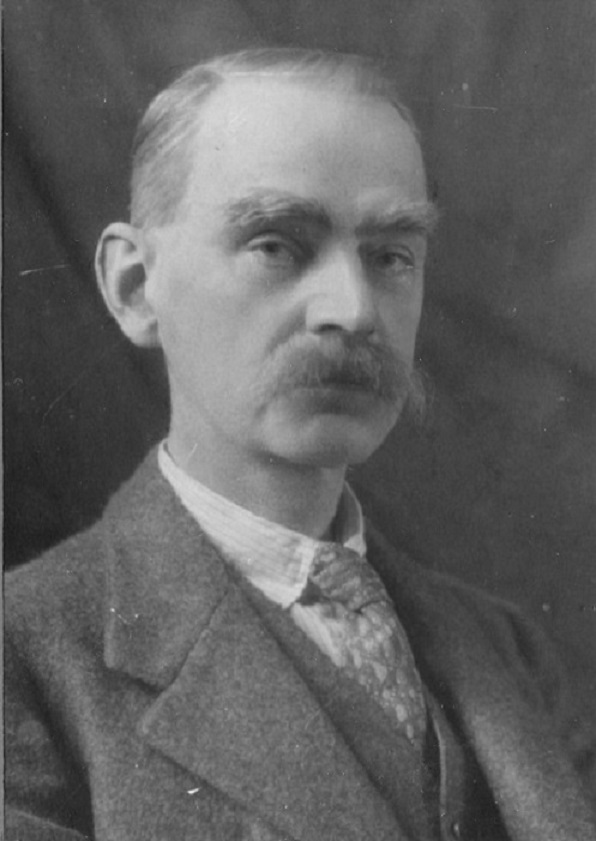Aldred F. Barker (1868-1964), Professor of Textiles, author, Collector
Details
Type of entity: Person
Name: Aldred F. Barker
Date of birth: 1868 (Leeds, West Yorkshire)
Date of death: 1964 (Portland, Victoria, Australia)
Roles: Professor of Textiles; author; Collector
Source of information: Special Collections
Profile

Professor Aldred Farrar Barker was the third Chair of the Department of Textile Industries from 1914 to 1933. He was also a prolific author on textile design and processes, and editor of ‘The Journal of the Leeds University Textile Association’ and ‘The Journal of Textile Science’. His research interests in world sheep breeding and wool production led to extensive international travel.
Chronology
1868-1884: Born at Fleet Mill near Oulton, Leeds on 31 May 1868, the son of Benjamin and Ellen Barker. Benjamin was a flannel manufacturer, owning Sheepshanks Mill on Kirkstall Road, and a member of the Leeds City Art Gallery committee. Until the age of 16 Barker worked at his father’s factory.
From 1884: Studied at the Yorkshire College with a Clothworkers’ Company Scholarship. Became Treasurer of the Student Association and was asked to establish the Student Textile Society. Sat for a Senior Scholarship. Became an Honorary Associate of the Yorkshire College and was awarded an MSc on the formation of the University of Leeds in 1904.
1887-1893: Appointed Head of the Textile Department, Saltaire Technical School. Founded the Shipley Textile Society.
1894-1914: Became Head of the Textile Department at Bradford Technical College. Designed and equipped Bradford’s Textile School. Founded the Bradford Textile Society.
1912: Invited to Cambridge University to assist Professor T B Wood (Professor of Agriculture) in sheep crossbreeding research.
1914: Elected to succeed Professor Roberts Beaumont in the Chair of Textile Industries, University of Leeds. His first public lecture was on ‘Sheep and Wool’ (29 September 1914).
1919: Toured Canada and the United States.
1921: President of the newly formed Leeds University Boat Club; carried out research on developing the wool supplies of Peru.
1923: Lectured on the degeneration of merino sheep to the Pan-Pacific Science Congress in Sydney, Australia. Lectured to the Theosophical Society on Evolution.
1926: Invited to visit Peru by the president to report on the potentialities of Peru as a wool-growing country. Spent six weeks in the country and visited a model sheep farm. Barker produced a report for the Peruvian government on ‘The prospective development of Peru as a sheep-breeding and wool growing country’ (1926). A film reel of this visit was discovered in the University and is available to view.
Late 1920s: Visited South Africa.
1930: Gave a radio broadcast to the BBC of a review of the wool trade from the 18th century to the present time. Lectured again in Sydney.
1931: Invited to Kashmir by the minister of the Maharajah of Jammu and Kashmir. He left London on 25 June and arrived in Jammu on 16 July. His original intent was to survey the sheep breeding and wool growing, but saw an opportunity to investigate the home and cottage industries, including the production of pashmina, carpets and shawls. He later published “A report on the Cottage textile industries of Kashmir and their prospective development”.
1933: Retired from Chair of Textile Industries, University of Leeds. His farewell speech is published in the 1934 Journal of Textile Science.
On retiring, he was offered a position at Chiao-tung University, Shanghai, arriving there in October 1933 with his son Kenneth Crookes Barker. Barker met former students of the University of Leeds, who assisted his tours of Chinese manufacturing. In 1934, after several months touring, Barker published a report on the textile industries of China and Japan.
Father and son amassed a quantity of Chinese textiles, from which the Qing Dynasty Collection is built.
1937: Barker lent his collection of Chinese silks and scrolls to the department to display at the graduation reception.
1938: Barker emigrates to Australia and set up a woollens and worsted business ‘Barker’s Textile Property Ltd’ with his sons in north Melbourne, with a second mill in Portland.
Late 1940s onwards: A Barker prize for undergraduates was established. In 1955 to 1960 Barker was an annual donor to the Department of Textile Industries (now residing in Portland, Victoria, Australia).
1964: Barker died aged 96.
Barker was also interested in camping and published on ‘motor camping.’

